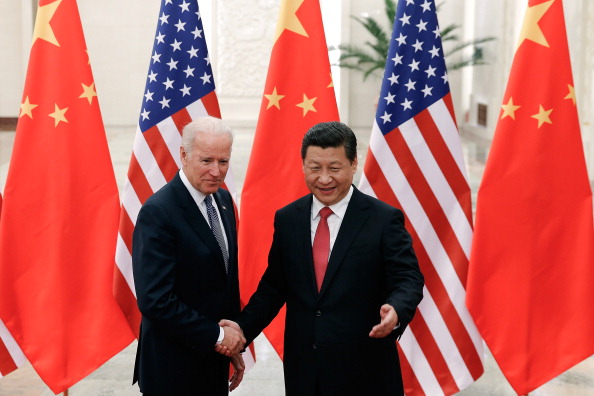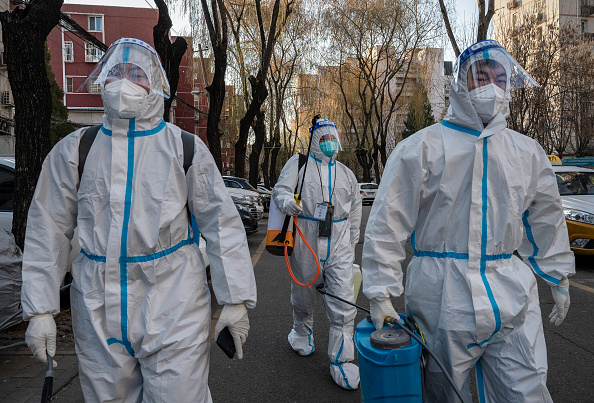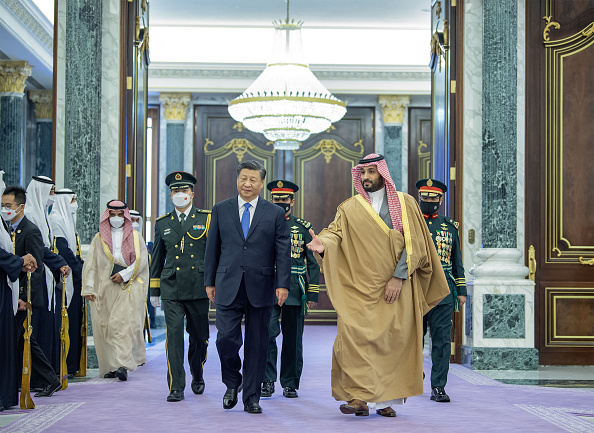
 Seeking Stabilization
Seeking StabilizationThe Biden administration has indicated that China is seeking more stabilized relations with the United States in the short term as it faces domestic challenges and pushback in parts of Asia. With the U.S. and Chinese militaries bumping up against one another in Asia, Biden's top Asia official said that China is seeking stronger ties with the United States as it seeks to improve its global and domestic standing.
Kurt Campbell said China's slowing economy and its struggles with COVID-19 have left Beijing wanting to avoid openly hostile ties with Washington. He added that elements of China's "wolf warrior" diplomacy have been unsuccessful, while efforts to challenge Japan over islands in the East China Sea and engage in military confrontations with India in the Himalayas have hurt Beijing's standing in the world.
"All of that suggests to me that the last thing the Chinese need right now is an openly hostile relationship with the United States. They want a degree of predictability and stability, and we seek that as well," Campbell said, suggesting that the coming months will see the "resumption of some of the more practical, predictable elements" of great-power diplomacy.
Meanwhile, the U.S. has been rallying NATO members in an attempt to oppose China in the "Indo-Pacific" by arguing that the alliance should curtail Beijing's influence, reduce dependencies and invest in its own capabilities. Earlier this year NATO allies finally agreed that China is a "challenge," writing that "we will work together responsibly, as Allies, to address the systemic challenges" that China poses to the military alliance.
Read more in "The Real China Threat: Treating Beijing as an Enemy Risks Turning it into One," by Doug Bandow, a Senior Fellow at the Cato Institute.
 Loosening Up
Loosening UpChina announced the most sweeping changes to its tough zero-COVID policies since the pandemic began three years ago, loosening rules that curbed the spread of the virus but had weakened the world's second largest economy and sparked the largest protests in over a decade.
The National Health Commission announced that people would no longer be required to show COVID-19 tests and clearance from a smartphone app to go about daily life, apart from in vulnerable communities such as nurseries, elderly care facilities, and schools. China also limited the scale of lockdown to individual apartment floors and buildings, rather than entire districts and neighborhoods.
After three years of COVID, the decision has caught many off-guard. Now the question is whether infections and deaths are set to surge. Feng Zijian, a former deputy head of China's Center for Disease Control and Prevention and one of Beijing's key medical advisers predicted that 90% of the population could get COVID as Beijing eases restrictions, calling it "inevitable."
Within days, newly reported cases of COVID-19 in China fell from a daily record of more than 40,000 to just 20,764, the vast majority of them asymptomatic, however it was unclear whether it was a result of less testing.
In response, officials in the U.S. urged China to adopt Western vaccines. "Whenever you have a large wave of transmissions of a virus, you give it ample opportunity to mutate. And when you give a virus opportunity to mutate, that allows it to form potentially new variants. And once you get a brand-new variant, that could have an impact on the rest of the world," Fauci said.
 A Growing Relationship
A Growing RelationshipChinese leader Xi Jinping is in Saudi Arabia for a three-day visit focusing on energy ties, as Beijing works to revitalize its economy and Riyadh seeks to expand its global influence and alliances beyond its Western partnership, particularly with the U.S. Xi met with the Saudi Crown Prince and Prime Minister, Mohammed bin Salman, which analysts have noted underscores the growth of importance of Sino-Saudi relations.
The two leaders released a nearly 4,000-word joint statement on Friday. The statement was published by the official Saudi Press Agency (SPA), and expressed agreement on various global issues, including energy, security, Iran's nuclear program, the crisis in Yemen, and the Russia-Ukraine war. They also emphasized the importance of "stability in the world oil markets," noting that Saudi Arabia is a reliable exporter of crude oil to its Chinese partner, and said they will work to "develop cooperation and coordination in defense fields."
The two countries signed several commercial agreements as well, initially valued at more than $29 billion, in sectors like clean energy, technology, and manufacturing. This includes establishing a Huawei cloud-computing region, building an electric-vehicle manufacturing plant in Saudi Arabia, and more.
Overall, Xi and Mohammed stressed that they will support each other while not interfering in each other's internal affairs. According to the PRC readout, "Saudi Arabia firmly supports the one-China principle, firmly supports China in safeguarding its sovereignty, security and territorial integrity, firmly supports China's measures and efforts to de-radicalize, and firmly opposes any external forces interfering in China's internal affairs."
Additionally on his trip, Xi told Gulf Arab leaders Friday that China would work to buy oil and gas in yuan, a move that would help establish Beijing's currency globally and weaken the U.S. dollar's grip on world trade.
Prepared by China-US Focus editorial teams in Hong Kong and New York, this weekly newsletter offers you snap shots of latest trends and developments emerging from China every week, while adding a dose of historical perspective.
- 2022-12-02 Turf Tension
- 2022-11-18 Thawing Ties?
- 2022-11-11 Face to Face
- 2022-11-04 The Pacing Challenge
- 2022-10-28 Third Time’s the Charm
- 2022-10-21 United as Steel
- 2022-10-14 Party Time
- 2022-10-07 Elections Incoming
- 2022-09-30 Hot Intrigue
- 2022-09-23 Global Gridlock
- 2022-09-16 Injecting Stability
- 2022-09-09 Cutting Edges
- 2022-09-01 A Win for Global Business
- 2022-08-26 A Heavy Price
- 2022-08-19 Risky Business
- 2022-08-12 Backtracking
- 2022-08-05 Cross-Strait Outrage
- 2022-07-29 Playing with Fire
- 2022-07-22 Nixonian Flexibility
- 2022-07-15 List Diplomacy
